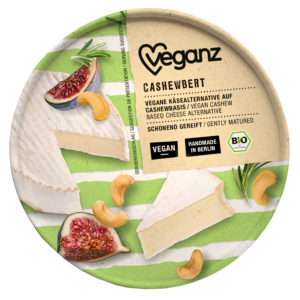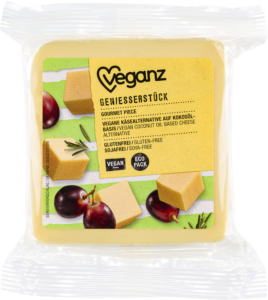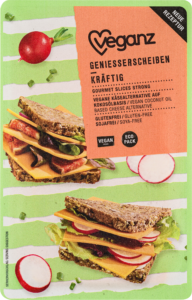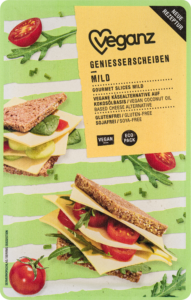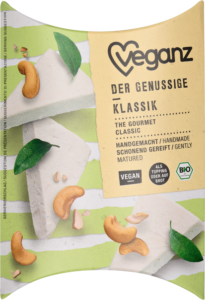
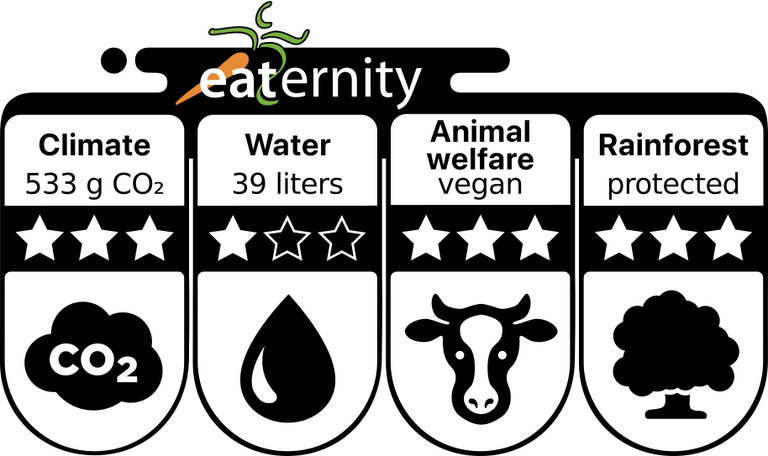
Der vegane Cashew-Käse mit Nachhaltigkeits-Score!
To find out what our vegan cheese alternative has to offer in terms of environmental and climate protection, all you need to do is look at the product packaging – at the Sustainability Score! This shows you the product’s CO2 footprint, water consumption and whether animals and the rainforest have been protected. Origin of raw materials, production, packaging, transport – everything has been calculated and compared to 110,000 other foods. We specify the results of this comparison in stars. From two stars upwards, the product is already more sustainable than the average comparable product. Why are we doing this? Transparency and environmental protection are very important to us. You get all the facts while at the same time, we have the chance to make our products more sustainable.

Moo, moo, moo says the cow, yoo hoo hoo sings the earth! Oh yes, thanks to our Organic Veganz Cashewbert’s vegan recipe, joy abounds for climate, cows, and rain forests. After all, the Camembert alternative scores in these categories with the full marks. That’s three stars! Here’s how we arrived at these results:
Climate
With a CO2 footprint of 533 g per package (175 g) the Organic Veganz Cashewbert shows that climate protection and enjoyment can be combined brilliantly. Conventional Camembert, on the other hand, has an emissions value of 1.397 g CO2 – that’s almost triple!
Why is it that the animal product has a worse climate balance? A few reasons: Direct greenhouse gas emissions from factory farming are caused by methane and nitrous oxide. Methanes are endogenous greenhouse gases produced by dairy cows themselves – and with 4.3 million dairy cows in Germany, that’s quite a lot. Nitrous oxide is released primarily when fertilising with liquid manure.
Indirect emissions are caused by the fact that more and more land is needed for grazing and feed cultivation. For this purpose, forests and grasslands have to give way or wetlands need to be drained. This is neither beneficial for us nor the environment, since forests absorb carbon from the atmosphere. It is also not uncommon for the food to have to be imported. This further worsens the ecological balance of conventional Camembert.
Animal Welfare
Traditional Camembert is made from cow’s milk. For cows to even be able to produce milk, they have to regularly birth calves. The fact that a cow can produce milk continuously is a result of regular artificial fertilisation. After the calf is born, the mother and its baby are separated from one another – and that’s cruel for both of them! In addition, dairy cows spend most of their entire lives in unsuitable dens. These stresses leave behind trauma and harm the animals. In comparison: A free-range, healthy cow can live up to 30 years, while a dairy cow has a life expectancy of just 5 years.
With the Veganz Cashewbert, we literally leave the cow alone: That’s because we use only a few selected, vegan ingredients like cashews, macadamia nuts and water.
Rainforest
The recipe of our soft cheese alternative is soy-free and without palm oil, which guarantees optimal protection against deforestation and therefore supports the preservation of our green forest areas.
The rainforest is so important because it has a major impact on our climate. It’s the green lung of our earth, so to speak. Plants, bushes, and trees absorb CO2 from the air and they use the carbon contained therein to grow. This creates oxygen. And who needs oxygen to survive? Right on the money… humans and animals!
If we destroy our rainforests, large amounts of CO2 are released – which enhances the greenhouse effect and contributes to global warming. Rainforest protection means climate protection! That’s why it’s of great importance to all of us that tropical rainforests are preserved.

Although the Veganz Cashewbert, with its vegan recipe and certified organic ingredients, does a lot for the environment, its water consumption is unfortunately still too high. This is due to the cashews from Vietnam. Their water footprint is relatively high because they need quite a bit of the precious liquid for their growth and the water supply infrastructure in the areas where they are grown has not been sufficiently developed as yet. In addition, the yield of the nuts is relatively low, i.e., although 3.3 kg of cashew nuts are irrigated, only 1 kg of peeled cashew kernels are obtained.
We have to find a solution – that is for sure. But unfortunately, we have no idea what. We could, for example, help directly on site or source the ingredients from another region. But whatever the solution, today’s know-how will flow into tomorrow’s products.
Ingredients
Cashew nuts* (50 %), water, macadamia nuts* (1,5 %), salt, starter cultures (Lactococcus lactis subsp. cremoris, Lactococcus lactis, Streptococcus thermophilus), mould cultures.
*from organic agriculture.

Nutrition information
Could it be that the Veganz Organic Cashewbert is somewhat reminiscent of a Camembert in terms of its appearance, as well as taste? Definitely! But instead of cow’s milk we use cashews and macadamia nuts. In addition, our cashew cheese is certified organic and free from soy, gluten and palm oil. Long list of chemical additives? Not with our cashew cheese! We wanted to keep it simple and as natural as we could – and with only six ingredients, we think we’ve managed to do that quite well, wouldn’t you agree?
As you surely know, Camembert is made by fermentation. That’ s exactly the same with our Organic Veganz Cashewbert! Thanks to certain cultures, cow’s milk cheese is made, or from cashews, cashew cheese!
- Starter Cultures – also known as lactic acids. Starter cultures are neither animals nor plants, but a separate species, so-called prokaryotes. Naturally vegan, because we refrain from using substances of animal origin in the cultivation of the microorganisms. In the Organic Veganz Cashewbert, we use the cultures for the fermentation of cashew nuts and macadamia nuts. Our cashew cheese matures for about 10 to 14 days. This creates a unique and mild aroma.
- Gourmet Mushroom Cultures: What would a Camembert be without its delicate, white exterior? Exactly! Only half as tasty and only half as beautiful. Of course, we didn’t want to miss out with our Cashewbert and have therefore provided it with some gourmet mushroom cultures.

The Organic Veganz Cashewbert is made by hand in the heart of Berlin and Spielberg, Austria. Our small but excellent production facilitys ferment, shape and pack it lovingly by hand. Isn’t that the best?
Whether on pumpernickel, sesame rolls or ciabatta – with our Organic Veganz Cashewbert, every bread is a good bread! In the mood for a vegan cheese plate? In addition to the Veganz Gourmet Piece, Gourmets and Gourmet Slices, our exquisite cashew cheese quite simply stands out on its own.

Packaging
We use these materials in this product.
Is the Packaging Sustainable?
Is the Cashewbert’s packaging sustainable? At this point we would have to answer with a “yes and no”. The package comes in two pieces: A cardboard box and a paper wrapper. The former is sustainable, while we still have to work with a plastic for the paper wrapper. You can find out why in the following sections:
- Cover Paper: First, the cashew cheese is wrapped in a paper wrapper. This is made out of two layers – a plastic layer and waxed paper. Although both layers are glued together, they can easily be separated from each other. This makes it possible for you to dispose of the waxed paper with the residual waste, while the plastic can migrate into the yellow bag. Why do we have to work with synthetic materials? That’s because it allows us to protect our cashew cheese from nasty bacteria and unstable transport. This also gives us the certainty that it will end up on your plate intact. In addition, the paper wrapper prevents moisture from reaching the good piece of cheese, which means that the cheese substitute has a much longer shelf life.
- Cardboard box: Now for the sustainable part of the packaging! The cardboard box consists of 90% wastepaper. Fresh fibres make up the remaining 10%. Furthermore, the packaging is recyclable, which means you can dispose of it with the wastepaper. Functionally, the cardboard box prevents the vegan camembert from being crushed and retains its shape.
As you can see, there are some aspects as to why plastics cannot be avoided and why it’s difficult to provide the best solution. But yes, as a vegan and sustainable brand, we feel an absolute obligation to look for more environmentally friendly alternatives – after all, ingredients and packaging go hand-in-hand. We’re not perfect, but we are keeping our eyes and ears open.

Even More Cheese Alternatives from Veganz
“I could never give up cheese!” And you don’t have to – at least not in terms of taste. After all, we have some really great and authentic cheese alternatives up our sleeves: whether sliced, grated or in blocks, in four exciting varieties. Well, which one are you going to try first?
Available at
-
 shop.veganz.com
shop.veganz.com -
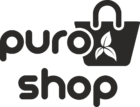 Puroshop | CZ
Puroshop | CZ -
 Rohlik | CZ
Rohlik | CZ -
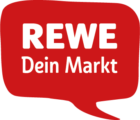 REWE | DE
REWE | DE -
AEZ / HIT | DE
-
 kokku-online.de | DE
kokku-online.de | DE -
EDEKA | DE
-
Spar | AT
-
 Vekoop | DE
Vekoop | DE -
 Vegasme | BE
Vegasme | BE
